An explanation of Tim Mackie’s Heaven and Earth by Pastor Jason Harms
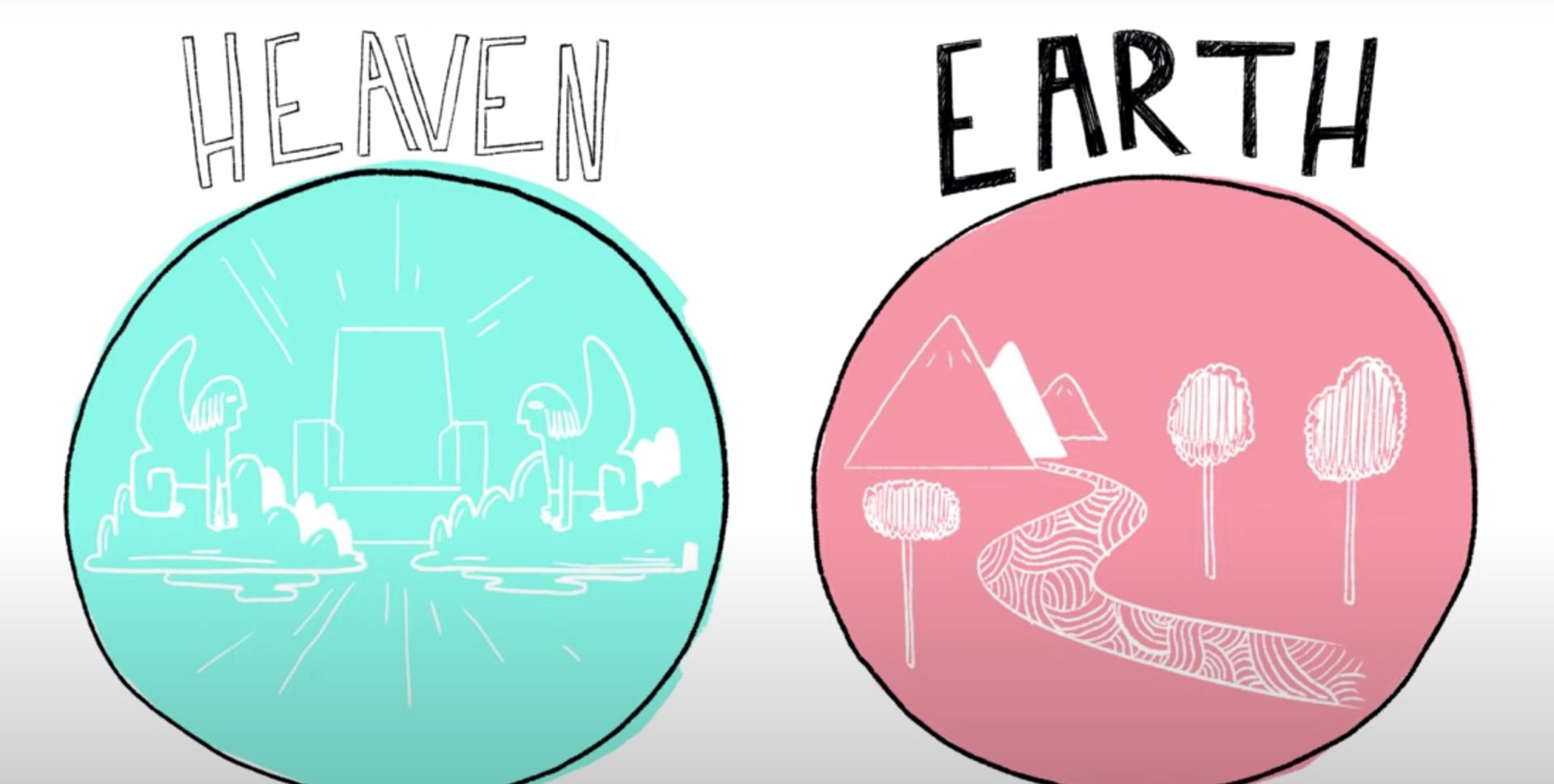
“The Bible refuses to be domesticated.” Its beauty is that it can be simple yet also complex. I think this video does a great job drawing us away from an oversimplification of the Gospel. It helps us catch a greater vision of God’s work in all creation from beginning to end. It moves us to participate with God in reconciling a hell-ridden world with the Gospel of Jesus. It creates a compelling story of God’s true work in Jesus.
First I will summarize Tim’s message in my own words. Then I will share my thoughts in the “theological questions” and “conclusion.” My main premise is that Tim talks about hell in ways the Bible does not, yet this doesn’t make what he says untrue. I think he takes some liberties in his phraseology that make his description of the Gospel story more poetic and visual. It may cause hiccups for people, especially when saying “we create hell,” when I don’t get that truth from the Bible (see “theological questions”). To me hell is a place God creates where He sends those who fail to receive His “sin-covering” in Jesus to experience the full wrath of His fury for sin.
I thought it was interesting in the video how little Tim talked about sin. He was much more focused on hell, and I think that could cause confusion for people. I think hell is both an experience and result of our sin.
A Summary of Tim’s Message of the Gospel from the Video
The Good News (Gospel) is that the Kingdom of God is at hand. The Gospel is not about us going somewhere but God coming here to us. We must move away from a ME-centered story to a GOD-centered story. God’s reign and rule over the world and our lives has come near in the person of Jesus. This means Jesus came to resolve a problem, the remaining story of Mark’s Gospel account.
A temple is where heaven and earth overlap. We see clearly in OT Israel’s temple, the one special habitation of God’s most holy presence on earth. Yet now through Christ’s coming in the NT, we experience the special habitation of God in ourselves – God’s most holy presence on earth by way of being in us!
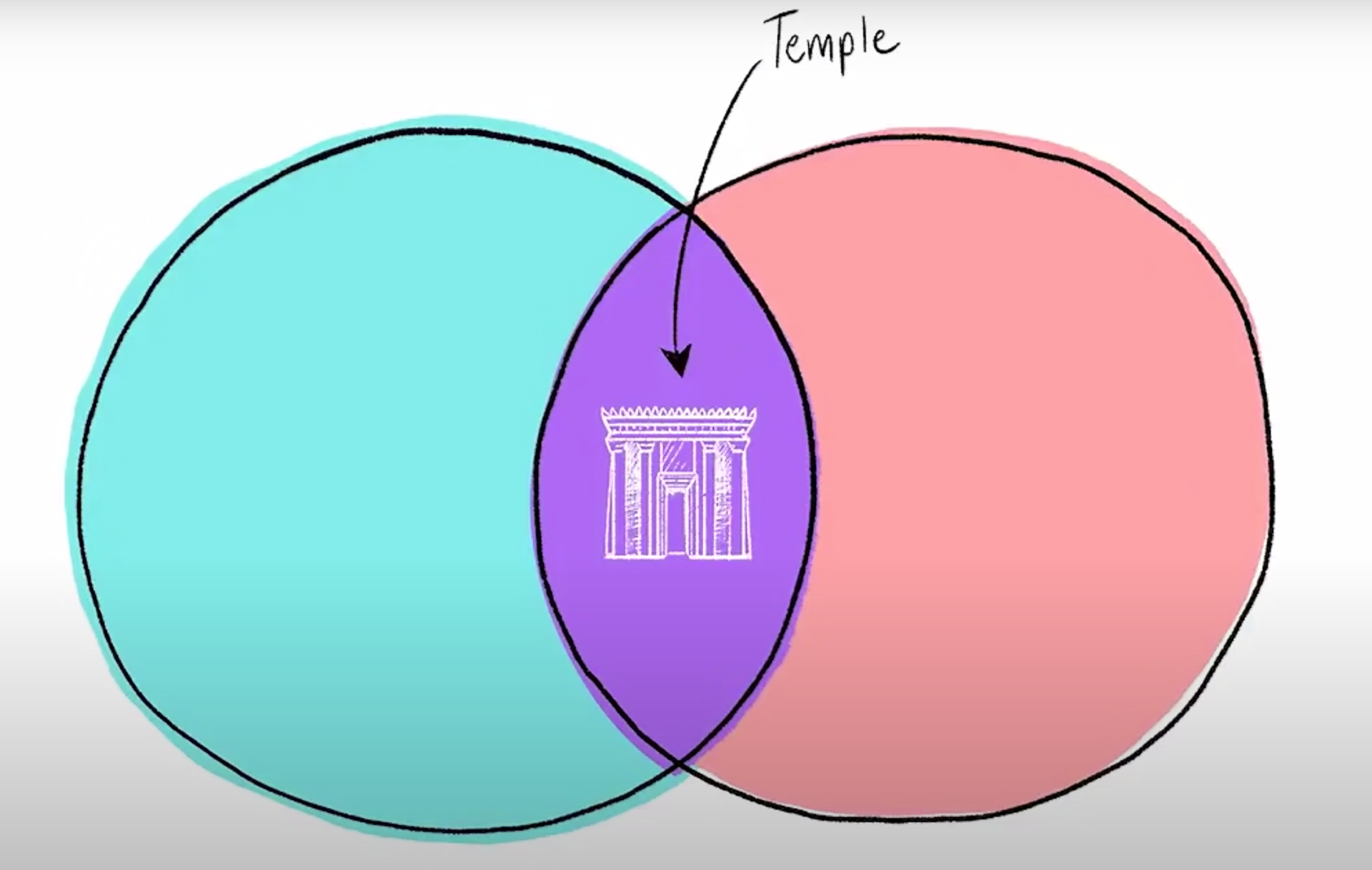
The separation of God’s space and human space was resolved in the OT by animal sacrifices. Animal sacrifices absorb the sin when they die in your place. It creates a clean space (in a sense) so that you can justly enter into God’s space (overlapping of circles). Yet this doesn’t resolve the full reuniting of God’s space with human space.
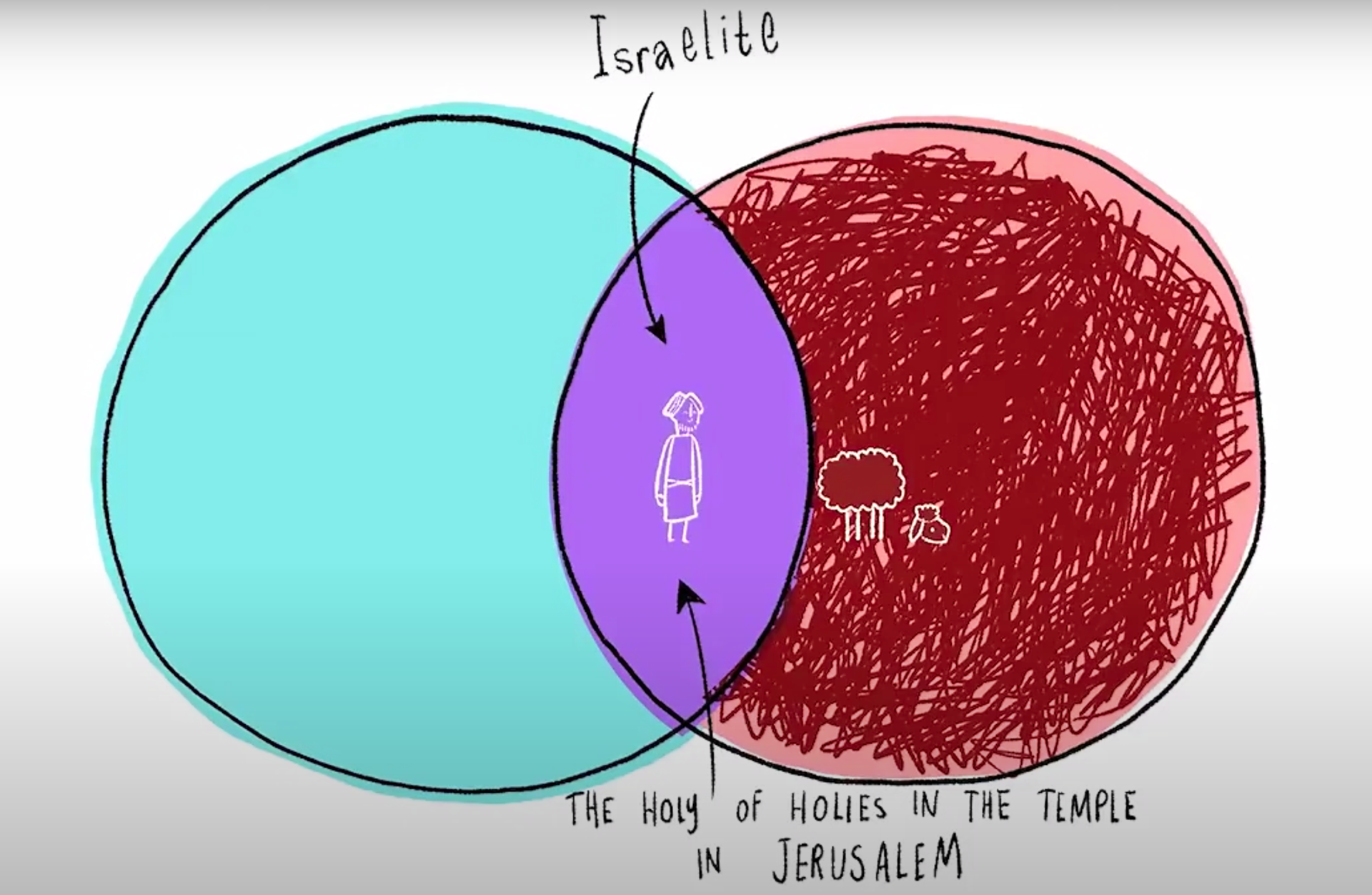
Then came Jesus to dwell among us, or literally, “to tabernacle” among us. Jesus came and sat up a tabernacle in Himself on earth with His incarnation. Jesus Himself is now the place where heaven and earth overlap! Jesus’ ministry was bringing the experience of heaven to humans in Himself. He created pockets of the experience of Heaven for others to know God’s love, justice, and forgiveness. He even told His followers to pray for His kingdom and will to come on earth as it is in heaven (a unification of the two circles).
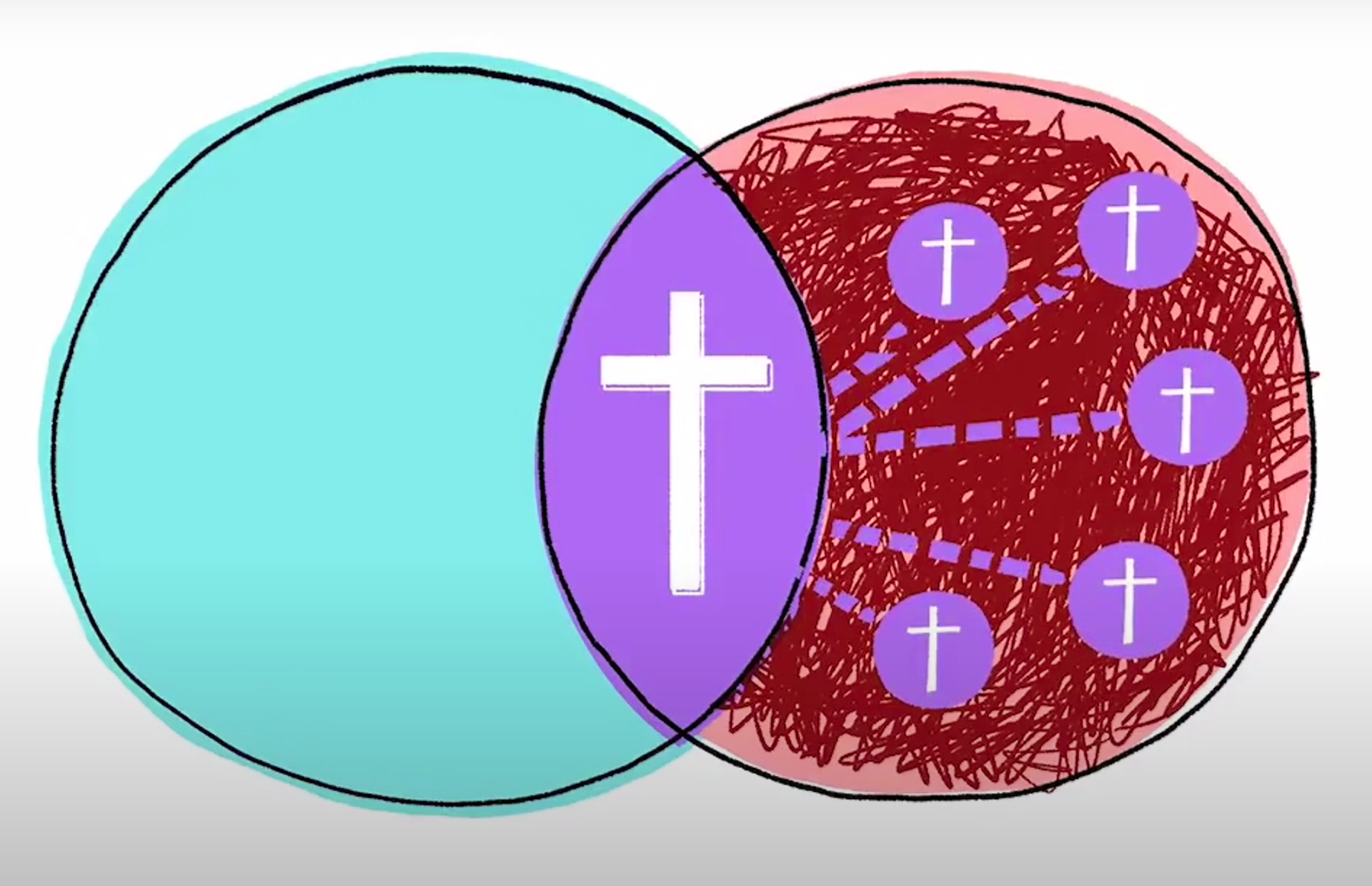
The climax of Jesus’ ministry was His death on the cross. This seems to put an end to His kingdom on earth, but we recall John the Baptist’s words: “Behold, the lamb of God, who takes away the sins of the world!” This expands Jesus’ identity from just the temple of God to the sacrifice of God! This means the cross is now the place where Jesus as our sacrifice (infinitely better than an animal sacrifice) absorbs our sin and creates a clean space, where God’s space and human space overlap with no limitation (unlike with an animal sacrifice).
What About Hell? Restating Tim’s View
This is all great, but what happens when I die? The focus of the Bible is not on my going away to be with Jesus. The focus instead is on the culmination of Jesus’ death and resurrection at His second coming when he will perfectly reunite heaven and earth. So the story of the Bible is about how God’s space and human space got ripped apart by sin, but in Jesus these two are being reunited now and will be fully reunited at His second coming.
It’s good for us to sum up this well-rounded articulation of the true Gospel with a conversation about Hell. We learn that Hell was not mentioned in Genesis 1:1: “In the beginning God created the heavens and the earth.” If God didn’t create Hell, who did? Humans created Hell by desiring to seize autonomy from God. James, Jesus’ half-brother, in James 3:6 suggests that when we speak evil, our tongues are set on fire by hell. In other words, we ourselves unleash “hell” on one another when we speak! Going further, hell is the unleashing of anything that degrades and diminishes our God-given dignity.
Sin is what we do; hell is what we experience.
We bring the experience of Hell to others even now by the sin we commit. This means Hell is a reality just as much now as it is in its fullness when we die. This is interesting. We see the same quality in Heaven: Heaven is now and not yet, and Hell is now and not yet.
We can say then the story of the Bible is one of God wanting to restore the perfect unity of heaven and earth by getting the hell out of earth (or “getting the hell out of us) by way of Jesus. For example, we can think of human sex trafficking. This is a raging “hell-fire” unleashed by God by the “sparks” of sin-distortion in our broken hearts. God hates the unleashed hell of sex trafficking, so Jesus came to confront this evil by cutting it down at the root in our hearts. Thus, Jesus came in His first coming to restore heaven on earth in our hearts (the root problem). He absorbs our sin, (or he absorbs the hell we created from our sin) and makes our hearts a clean place. This is the way God gets the hell out of us without destroying us.
So Jesus’ death on the cross is simultaneously the death and resurrection of Jesus AND the death and resurrection of our world. It shows the story is bigger than just us. It’s about Jesus’ vindication over all death (or hell) in the world that enables His restoration of all things to justly begin and consummate at his second coming. God gets the hell (or the experience our sin creates) out of us now by way of us believing in His Son. Therefore, right now we get to be ministers of His reconciliation amidst a broken world. Because we know God’s healing of our hell (by absorbing and covering our sin), we are inspired to share this so that others also may be healed of the hell in their lives. Jesus came to create pockets of heaven on earth and now we are charged to do the same – create pockets of heaven on earth as we bring the good news of Jesus into the hell of others.
At the end of all things, when heaven and earth are perfectly reunited in Christ, all “hell” must get out. It’s no longer allowed or able to affect God’s good Kingdom. So hell is pushed outside of God’s Kingdom. Those who refuse to participate in God’s restoration of heaven and hell will be removed and placed in a forever experience of hell (or the created result of their sin.)
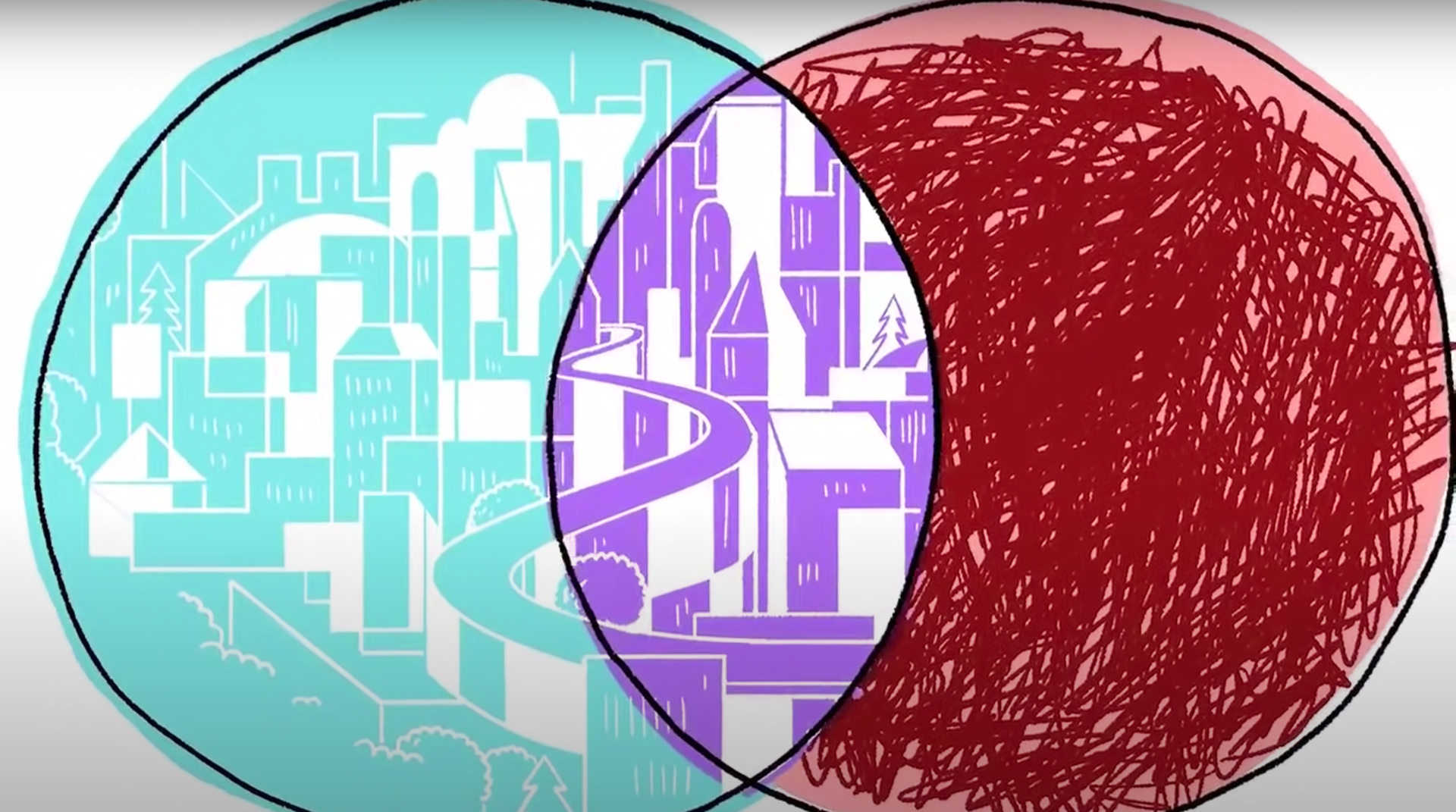
Theological Questions
Perhaps the big question in people’s minds is who created Hell: God or us? Is it just an experience of our sin or is it a place? Colossians 1:16 teaches us that God created all things. Matthew 25:41 says that hell is a place prepared (or initiated by God) as a place for Satan and his demons. Jesus is the one who casts people into hell (Luke 12:5). Hell is a God-created result of our sin (by way of His wrath), not a man-created experience. So we must be careful from watching such a video to not conclude that Hell is something we create. Hell is a place God creates and casts people to experience the full weight of His wrath. Since they didn’t accept Jesus’ wrath-absorption on the cross, they now must absorb that wrath themselves.
It is true that people experience a limited version of hell now as a result of a sin-stricken heart and sin-cursed world, but what seems consistently true in Bible terminology is God’s mission to cover our sin, not get hell out of us. However, (so as not to throw the baby out with the bathwater), Jesus does get the hell out of us by absorbing our sin! Jesus’ mission is to get the hell out of us at the root and to ultimately get all hell out of his world SO THAT His heaven can fully reunite with earth.
Conclusion
Therefore, I’m ultimately fine with the way Tim Mackie portrays hell. While he speaks of hell in a different way than the Bible seems to communicate hell, it still rings true with the ultimate mission of what God is accomplishing: Getting the hell out of us and the world by confronting it in the arrival of Jesus, defeating it in the death of Jesus, and renewing it in the resurrection of Jesus.
We just need to make it clear that hell is both an experience now and a place people go to. God created hell, but our sin sends us to hell. Our sin initiated the experience of hell and our sin with Jesus’ rightful reign is what gives Jesus the authority to cast us into hell.
